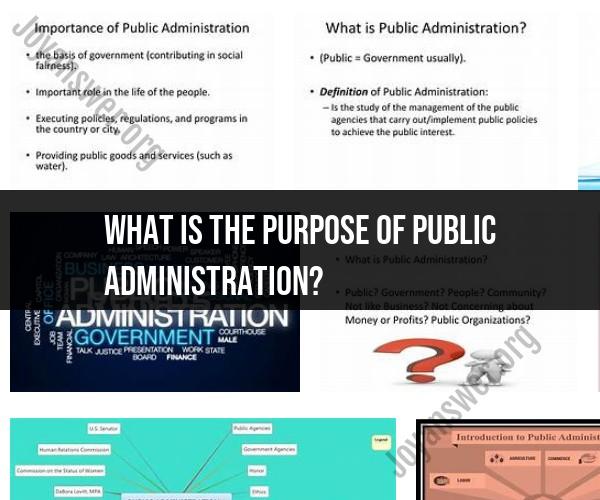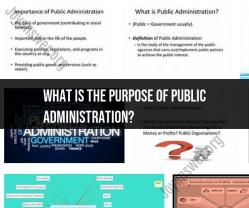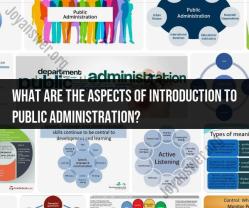What is the purpose of Public Administration?
Public Administration is a critical field that plays a pivotal role in the functioning of government and the delivery of public services. Its purpose is multifaceted, and it serves several significant functions:
1. Implementing Public Policy:
- Public administrators are responsible for translating government policies and legislation into practical actions and programs that benefit the public. They ensure that policies are effectively executed to achieve intended goals.
2. Efficient Resource Allocation:
- Public administration involves the allocation and management of public resources, including finances, personnel, and infrastructure. Administrators strive to allocate resources efficiently to meet public needs and priorities.
3. Service Delivery:
- One of the primary purposes of public administration is to deliver essential services to citizens and communities. This includes services such as healthcare, education, transportation, public safety, and more.
4. Regulatory Oversight:
- Public administrators create and enforce regulations and standards to ensure public safety, environmental protection, and adherence to legal and ethical norms.
5. Policy Analysis and Advice:
- Public administrators analyze complex policy issues, conduct research, and provide informed advice to policymakers. They help elected officials make informed decisions.
6. Budget Management:
- Administrators are responsible for developing, managing, and overseeing government budgets. They ensure that public funds are spent wisely and in accordance with legal and ethical guidelines.
7. Public Engagement and Participation:
- Public administrators often engage with the community to gather input, address concerns, and involve citizens in the decision-making process. They promote transparency and accountability.
8. Crisis Management and Disaster Response:
- During emergencies and crises, public administrators play a crucial role in coordinating response efforts, providing aid, and ensuring public safety.
9. Governance and Institutional Development:
- Public administration contributes to the development and improvement of governance structures, including the strengthening of democratic institutions and public sector reform.
10. Adaptation to Changing Needs:- Public administration must be adaptable and responsive to evolving societal challenges, technological advancements, and changes in public expectations.
11. Accountability and Ethical Conduct:- Administrators are expected to uphold high ethical standards, promote accountability, and prevent corruption within government agencies.
12. International Relations and Diplomacy:- Public administration extends to international relations, where administrators engage in diplomacy, negotiate treaties, and represent their countries on the global stage.
13. Research and Innovation:- Administrators engage in research and innovation to develop better policies, practices, and technologies that enhance public service delivery and governance.
14. Social Equity and Inclusion:- Public administration strives to ensure that government policies and programs are inclusive, equitable, and address the needs of all segments of society, including vulnerable populations.
In essence, the purpose of Public Administration is to serve the public interest, uphold democratic principles, and facilitate the effective and efficient operation of government. It is a dynamic field that continuously evolves to address the complex challenges and opportunities of the modern world, ultimately striving to improve the well-being and quality of life for citizens and communities.



